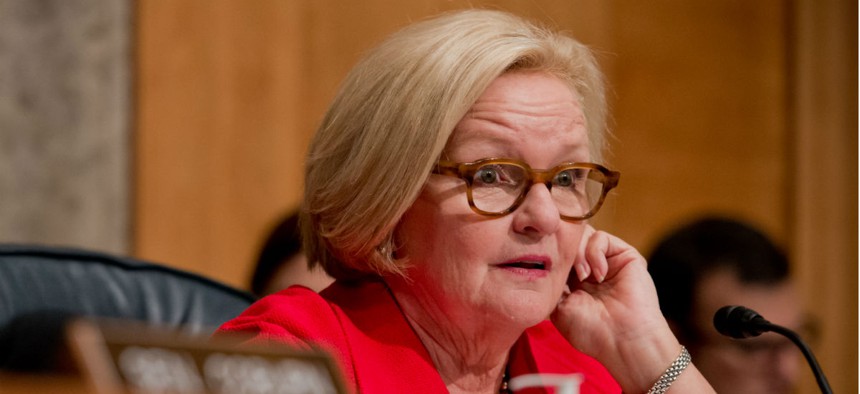
Sen. Claire McCaskill, D-Mo., sought the expansion of whistleblower rights. Flickr user Senator Claire McCaskill
Intelligence Community Contractors Gain Whistleblower Protections
Advocacy groups have mixed reaction given reauthorization of surveillance authority.
The Senate’s approval on Thursday of a controversial six-year reauthorization of the National Security Agency’s surveillance authority means that contractors in the intelligence community will regain protections that encourage responsible whistleblowing.
The bill, which cleared the House last week and passed the Senate 65-34, renews procedures in place years ago to allow contractor employees—about one-fourth of the intelligence community workforce—the same incentives and protections as employees to blow the whistle on waste, fraud or abuse without fear of retaliation. Employees have protection under President Obama’s 2012 Presidential Policy Directive 19, Part A.
Such an expansion of whistleblower rights had been sought by Sen. Claire McCaskill, D-Mo., in a bill introduced last October, and her vote earlier this week helped give Republicans the margin they needed to shut down debate from opponents of the larger bill. Critics had objected to warrantless surveillance of communications that involve domestic parties. (McCaskill’s office did not respond to inquiries on Thursday by publication time.)
The nonprofit Government Accountability Project, which offers legal aid to whistleblowers, is “very excited about the provision,” GAP investigator Irvin McCullough told Government Executive. “It’s a huge milestone. Contractors are now protected to report wrongdoing, which will encourage internal disclosure and discourage external leaks.”
Liz Hempowicz, public policy director at the nonprofit Project on Government Oversight, was less enthusiastic. POGO has opposed the overall bill as an invasion of privacy. “It’s encouraging that Congress has recognized that intelligence community contractors should have whistleblower protections restored,” she told Government Executive. “However, the protections included in S. 139 lack the enforcement mechanisms necessary to ensure that IC contractors aren’t subject to retaliation. Further, it’s disappointing that these protections are tied to warrantless surveillance authority that may affect many Americans.”
David Berteau, president and CEO of the Professional Services Council, which represents 400 contracting firms, noted that the legislation headed to President Trump is “really consistent with the whistleblower protections [that are] already in place for most government contractors in the arena and have been for years. It’s consistent with good management practice across the government, both for employee behavior and for the opportunities” available to them, he said.
“As always, legislation doesn’t determine the implementation,” he added, noting that the way the government administers whistleblower protections for employees differs from how contractors do it. “The government employee has an internal process for reporting retaliation. For contractors, the process is done through contacts. It gets driven one contract at a time.”
Sign up for GovExec newsletters and alerts and download our app to stay informed.







